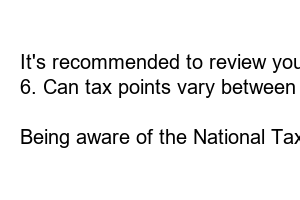국세청 세금포인트
Title: A Comprehensive Guide to National Tax Service Tax Points
Introduction:
With taxes being an essential part of our lives, it’s crucial to have a clear understanding of the tax points provided by the National Tax Service. This blog post aims to shed light on these tax points to help individuals navigate the intricacies of tax regulations and make informed decisions.
1. What is National Tax Service?
The National Tax Service is a governmental agency responsible for tax administration and collection in many countries. It plays a vital role in ensuring tax compliance, handling tax inquiries, and providing support to taxpayers.
2. Importance of Knowing Tax Points
Understanding tax points is crucial as it allows individuals and businesses to optimize their tax strategies, minimize liabilities, and avoid potential penalties. Familiarizing yourself with tax points can help ensure you take full advantage of available deductions and credits, and accurately report your income.
3. Tax Points Explained
Tax points encompass various areas, including income tax, property tax, sales tax, and more. *Income tax* refers to the tax levied on an individual’s or entity’s income, while *property tax* is imposed on the value of one’s real estate or personal property. *Sales tax* is a consumption tax imposed on goods and services.
4. Understanding Deductions and Credits
Mastering deductions and credits is essential for taxpayers to minimize their tax liabilities. Deductions allow taxpayers to reduce their taxable income, while credits provide a dollar-for-dollar reduction in the amount of tax owed. Proactively exploring these opportunities can have a significant impact on your tax return.
5. Common Mistakes to Avoid
To avoid potential errors and to ensure accurate tax reporting, it’s crucial to steer clear of common mistakes. These include incorrect filing statuses, failure to report all income, overlooking deductions or credits, and not keeping track of expenses. Being aware of these pitfalls can save you from future headaches.
6. How Professional Assistance Can Help
Navigating the complexities of tax points can be overwhelming, especially for individuals and businesses with unique circumstances. Hiring a professional tax consultant or using tax software can ensure that you meet all the necessary requirements and take advantage of every available opportunity.
FAQs:
1. Can I apply tax points retroactively?
No, tax points typically need to be applied for the specific tax year and cannot be applied retroactively.
2. How can I determine my filing status?
Your filing status is determined by your marital status and household situation as of December 31st of the tax year. Choose the one that most accurately describes your situation.
3. Can I claim expenses without proper documentation?
To claim expenses, it’s crucial to maintain accurate records and documentation to support your deductions. Without proper documentation, the IRS or NTS may disallow your claim.
4. Are there any penalties for filing taxes late?
Yes, both the IRS and NTS impose penalties for late filing and late payment of taxes. It’s advisable to file your taxes on time or request an extension if necessary.
5. How often should I review my tax points?
It’s recommended to review your tax points annually, considering any changes in personal or financial circumstances that may impact your tax situation.
6. Can tax points vary between states or countries?
Yes, tax points can vary between regions or countries due to differing tax laws and regulations. Ensure you are familiar with the specific tax guidelines applicable to your situation.
Summary:
Being aware of the National Tax Service tax points is essential for all taxpayers. By understanding these tax elements, individuals and businesses can make informed decisions, optimize their tax planning, and minimize liabilities. Don’t forget to consult professionals or use reliable tax software, as even minor errors can have significant consequences. Stay proactive, stay informed, and make the most of the available tax opportunities.

